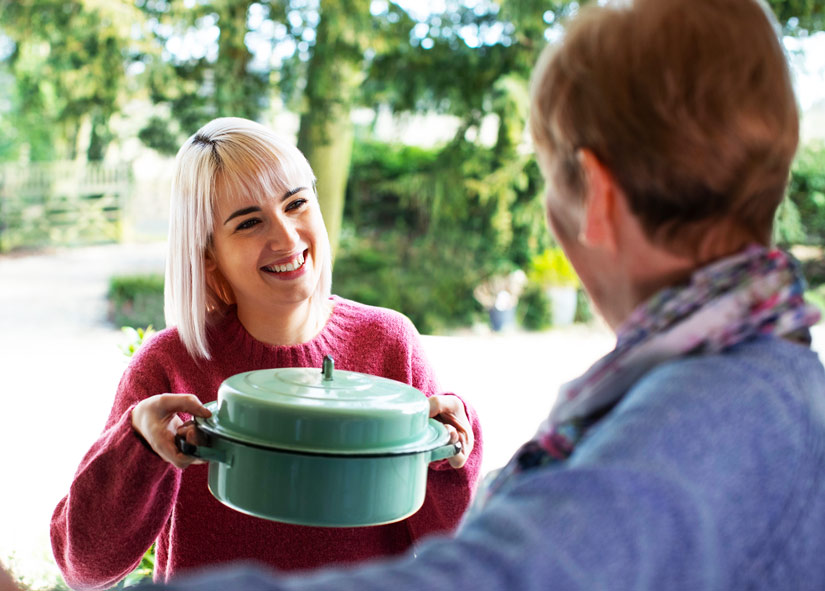Sound Advice
Flight attendants always give passengers an important piece of advice when sharing emergency procedures: make sure you are wearing your own oxygen mask before you try to help others.
After all, you’ll be no help to anyone if you collapse from a lack of oxygen, right?
The same thing is true when you’re in recovery: Take care of yourself before you try to help others.
It’s important to note, however, that the advice isn’t just to take care of yourself and ignore everybody else. Instead, it’s about the order of operations—first this, then that.
Once the foundation for sobriety is in place and withdrawal is behind you, you can start to consider how you might give back to others. Notably, this is no simple exercise in paying it forward. Finding meaningful ways to serve your community also supports your recovery.
How to Get Started
Think about the causes and issues that are important to you. Maybe you’re an animal lover who would enjoy working in a no-kill shelter. Perhaps you have a heart for making sure the elderly in your community have reliable transportation and regular companionship. Food pantries and community gardens, homeless shelters, arts organizations, youth centers and sports programs—no matter what you deeply care about, there is likely a related volunteer opportunity nearby.
Explore the social service, arts and culture, and faith-based organizations in your community to find volunteer opportunities that resonate with you. Odds are, you won’t need experience or a lot of training. If you’re willing to help out, there are people and places who will be eager to welcome you to the team.
It’s worth noting that volunteering can also have significant benefits for job seekers. Your volunteer position will give you opportunities to demonstrate your skills, your passions, and your commitment. Those you work for and with may become important references for you during your job search—or maybe your volunteer work will lead directly to a paid position. Keep your heart in the right place, but don’t miss opportunities to support your career goals.
If you’re not quite ready to get out in the world but still want to start making a difference, you might explore volunteer options that can be completed at home. Sites including Volunteer Match and Virtual Volunteer can connect you to opportunities.
Start Small with Random Acts of Kindness
Too soon for the demands of a steady volunteering gig? That’s just fine. It’s good to be aware of where you are in the recovery process and what your limitations might be in the early going. But that doesn’t mean you can’t do small things that will brighten the lives of those around you and provide you the positive boost that comes with performing random acts of kindness.
There is even an organization—named, appropriately enough, Random Acts—that offers inspiring stories, ideas for showing compassion, and a program for financial support of acts of kindness.
But you don’t need a website or a whole organization to perform some random acts of kindness on your own. There are small but significant things you can do every day.
- Pay for a stranger’s meal or coffee—and tip your server generously
- Bring treats for your coworkers or friends—especially if you make them yourself
- Shovel snow, rake leaves, or pull weeds for a person in your neighborhood who could use some help
- Make donations—whether of money or unneeded items—to individuals and organizations that can truly use them
- Send notes of thanks and encouragement to the important people in your life
- Buy some extra canned goods to take to the local food pantry
The opportunities to make a difference in the lives of those around us are endless—and the resulting positive feelings are good for you and support your recovery.
Stepping Up for Someone Else: Becoming a Sponsor
Earlier, we talked about the importance of picking a cause or issue that’s important to you as you seek volunteer opportunities. It may turn out that what you’d truly like to do is help others with their recovery. If you’ve turned your life around with the help and support of others, it would be natural to want to provide that kind of support to others going through recovery by becoming a sponsor.
Becoming a sponsor requires a full year of sobriety. As you participate in a 12-Step program during that first year, you’ll discover firsthand how important a sponsor can be to your recovery. You’ll also discover that a sponsor doesn’t have a formal job description. But successful sponsors do share some key characteristics which include:
- A commitment to being a positive role model
- A belief in the positive ways recovery can impact a person’s life
- A readiness to share their personal experiences and knowledge in support of someone else’s efforts to get and remain sober
- An ability to explain the details of a 12-Step program and emphasize their importance to the recovery journey
- A focus on guiding a newly sober person through the 12 Steps and on addressing the challenges inherent to the early days, weeks, and months of recovery
- An understanding that romantic entanglements between a sponsor and the person they are supporting are always problematic and should be steadfastly avoided
If you are a person armed with these traits, chances are you can truly make a difference in the life of someone struggling to break free from addiction. Doing so may be one of the most rewarding experiences of your life.
We’ll Help You Improve Your Life—and Your Community
Remember those wise flight attendants. It is essential that you take care of yourself before you try to help others. Bel Aire Recovery Center in Kansas is fully prepared to help you help yourself with our expertise and complete array of treatment options. Together, we can get you on a path rich with opportunities to contribute to the betterment of your community.




